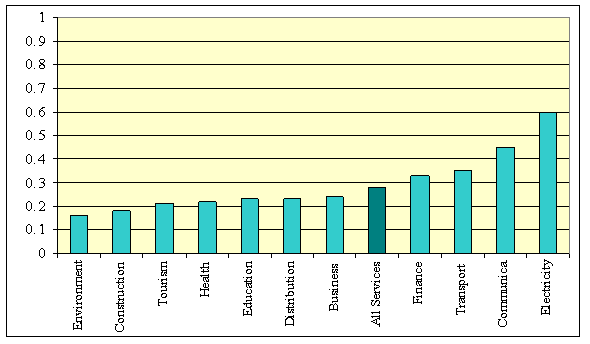An UNCTAD study released today reveals notable differences in the openness of developing countries and economies in transition to foreign direct investment (FDI) in services. The study is based on a comprehensive compilation and analysis of data related to FDI restrictions in 50 countries in Latin America, Asia, Africa and Europe, and covering a wide range of service industries.
The study finds that Latin America and the transition economies of Central and Eastern Europe are on average more open than countries in Africa and developing Asia (figure 1), but with significant intra-regional variations. According to the report, the Czech Republic, Bolivia and Uganda had among the lowest restrictions on FDI in services, whereas the Philippines, Ethiopia and Saudi Arabia are at the other end of the spectrum. Sectorally, environment, construction and tourism are the service industries with the lowest overt restrictions on inward FDI, while electricity and telecommunications remain relatively highly restricted fields (figure 2).
The new study finds a positive correlation between FDI inflows in services and the degree of openness. It also shows that earlier studies, which have primarily relied on information contained in the country schedules of the General Agreement of Trade in Services (GATS), have tended to underestimate the extent to which countries have opened up their service industries to FDI. Countries have been more willing to liberalize unilaterally than multilaterally, for various reasons, including the wish to maintain policy space for their Governments.
FDI in services accounts for about two-thirds of FDI inflows worldwide and for about 55% of FDI inflows into developing countries. Such FDI can play an important role in development by attracting financing, maintaining balance of payments, attracting technology, knowledge and skills, and generating employment.
At the same time, FDI inflows can generate concerns and have potential costs that have to be addressed through appropriate policies. Potential costs rise if appropriate regulatory frameworks are missing; if institutions and instruments needed to manage such matters as privatization and utilities are weak; or if FDI is undertaken in socially or culturally sensitive areas. Indeed, as many services are embedded in the social, cultural and political fabric of societies, the challenge is to strike a balance between economic efficiency and broader development objectives. This helps to explain why many countries have retained restrictions on FDI.
Figure 1. Average restriction scores (1) by region, all services, 2004 or latest available year

Figure 2. Restriction scores(1) by industry, average of all countries,2004 or latest available year
Source: UNCTAD



